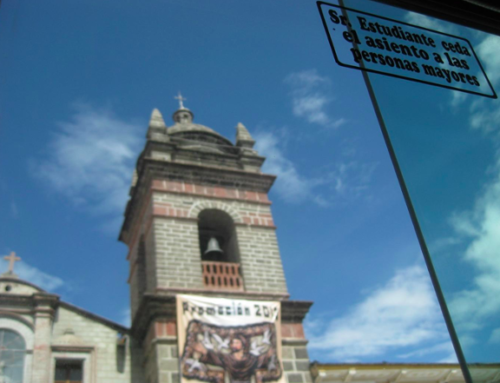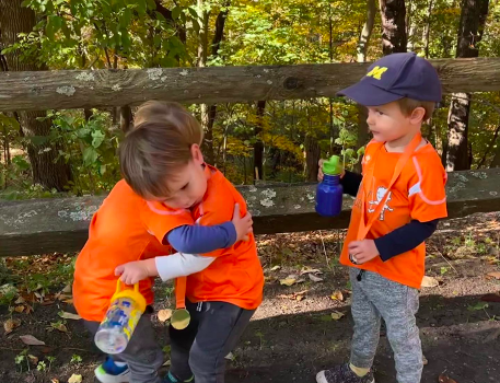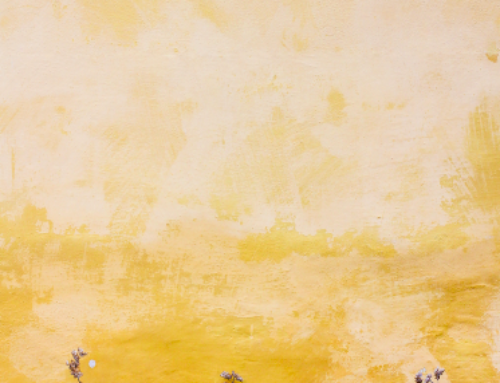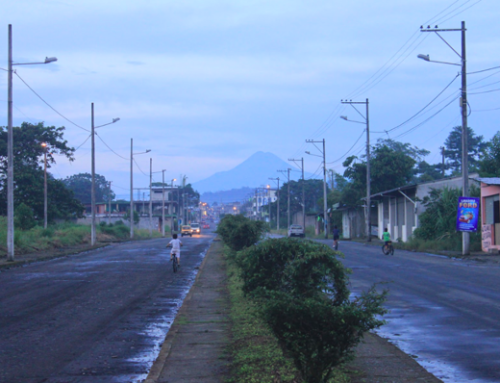In this essay, we offer an anthropological perspective on care and environmental studies, in which we involve more-than-human actors. This conceptualization emerges from our participation in a collaborative project that generates socio-environmental feminist epistemologies from Latin America. Our reflections are the product of two years of knowledge co-creation and mutual learning, which have coincided with a period in our academic trajectories where attending to matters of “care” sometimes seemed impossible. On numerous occasions we found ourselves wondering how care is constructed in a society confronting precariousness, illness, isolation, and environmental destruction. We pondered the potential that academia may have in enabling or impeding care in the face of these complex problems.
In the following sections, we ask: Can we feel-think (senti-pensar) care from the precarious places in which we carry out our anthropological work? If so, how is this care practiced at the intersection of the classroom, the human, and the more-than-human communities in which we conduct our research? What might our perspective offer to anthropology, to multi-species and more-than-human studies? We hope that our reflections contribute to a growing body of socially engaged scholars who seek to build better worlds by co-constructing knowledge with their research communities.
Patchworking Perspective on Care
Our mutual perspective on care stems from our respective fieldwork in the region of Michoacán, Mexico. Although we have not yet met in the field, we have observed, in parallel, the destruction of the forest that we move through due to the expansion of the avocado frontier. Marcela “thinks-with” water access and rights in more-than-human terms, exploring the scarcity of water facing the humans and other beings who inhabit the forest. Columba thinks-with migrant communities’ ancestral and contemporary relationships to the migratory monarch butterfly. We both have documented how the expansion of the cash crop frontier compromises this region’s last life-sustaining “green” corners.
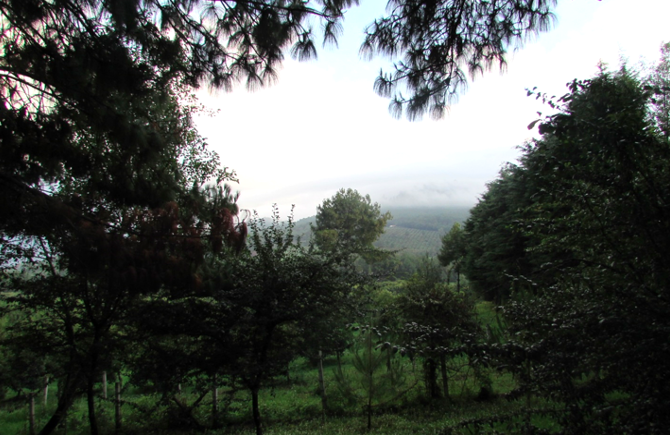
Avocado plantation in Tingambato, Michoacán. Photo credit: Marcela Morales-Magaña.
Following Jarosz (2014), we situate our research ethically and politically in our human and nonhuman research communities. We extend this constellation of care to our respective classrooms in Mexico (Marcela) and in Canada (Columba), and to the other formal and informal academic spaces that we inhabit. In this context, we are both committed to engaged and affective pedagogies that involve our students in research. We also engage with ideas about care as part of a continent-wide research network called the “Socio-Environmental Cartographic Patchwork.” The ideas presented here reflect the sum of these experiences and relationships.
We depart from the view that every living thing has needs, it should be attended to in some way as a “matter of care” (Puig de la Bellacasa 2017). We take up Denise Najmanovich’s definition of care as “the bonding ways in which there is a vital interest concerning others, with attention to the bond and full presence in the situation, recognizing the other as a legitimate other in coexistence.” Care, then, can be understood as an ecology of knowledges (Najmanovich 2021) or, as Isabelle Stengers (2013) puts it, an ecology of practices. Our understanding of care as “a way of living and living together” centers the inescapable interrelationships in which we are enmeshed, in all their complexity, tension, and discomfort (Najmanovich 2021, 237). It gestures towards experimental research and teaching practices that allow us to enable each other to respond and become implicated with each other: to assume respons-ability, as Donna Haraway (2020, 34-36) expresses it.
In Spanish, to be implicated is “to wrap in folds, to commit someone to something.” Indeed our understanding of care is based on the networked folds and mutual affects through which we become entangled with our colleagues, students, human, and more-than-human research subjects. From our situated research and teaching experiences, we have come to understand care or “implication” as a sustained daily practice. We believe care is activated once it reaches, affects, and enables others. Practicing care, in turn, demands our willingness to let ourselves be affected and implicated with our research and teaching communities. To think in “implicated” ways, we suggest, is to observe a problem, in our case a socio-environmental one, with a commitment to responding in ways that assume accountability for our own actions and enable the actions of others. In this way, it is a concrete form of situated praxis.
We see care, in short, as emanating from an engaged, daily practice that manifests as a living exploration. It encompasses the human and more-than-human worlds with which we communicate, and in which we center our teaching and activist scholarship. Thus, we embrace care as a multidirectional and experimental process of being with others. It allows us to collectively learn and activate practical, affective, and sustained “doings.” We refrain, however, from romanticizing care. On the contrary, working with this understanding of care is often uncomfortable. It is tense, politicized, and contingent. Sometimes it unsettles and uproots us.
In the next section, we illustrate these ideas by discussing one site of implication emerging through the Patchwork project introduced above. We describe one of the care-building practices and related epistemic devices we have developed, which we call building “epistemic friendships.” The Patchwork collectively generated “extended frameworks” are still very much in gestation. Thus, while conventional citation policies preclude including as co-authors all of those whose affectations and collective inseminations inspire this work, we recognize the contributions of our Patchwork collaborators here.
Towards a Praxeology of Care: Epistemic Friendships
Enabling care requires collective thinking, yet we suggest that such a collective task cannot be achieved through conventional forms of scholarly collaboration among co-authors. Before thinking together in the Patchwork, we find it beneficial to map ourselves out. This allows us to see and situate ourselves in relation to each other. It sheds light on our respective academic paths and desires, and builds toward an understanding of how each of us thinks and invites others to think with more-than-human worlds. This first step of the Patchwork entails building a constellation of actors and creates a scaffold from which we approach the practice of care. In doing this, we develop “epistemic friendships.”
Epistemic Friendships: Resisting Cruelty Through Collective Thinking
Building epistemic friendships is not just about finding common ground based on research interests or disciplinary affiliation. Rather, we seek to build wider affective and intellectual relations within the research collective to prepare ourselves to respond carefully to situations of cruelty, helplessness, and a lack of “real” listening (Segato 2018). Inspired by other similar initiatives within feminist scholarship, epistemic friendships “challenge us to extend the conceptual borders of how and with whom knowledge is produced and, in turn, where it is produced. One way to resist injustice and to transform practices that perpetuate oppression is to make knowledge in solidarity with others” (Nguyen, Nastasi, et al. 2016, 21).
Building epistemic friendship summons for us an academic disobedience of a political economy of knowledge that commodifies everything, even dissident practices (Rivera Cusicanqui 2010, 65), and one that attempts to offer explanations and solutions under single authorship. We have observed that responses coming from a single person or a single perspective are fruitless. For example, taking care of Michoacan’s forest and its inhabitants is not a mere speculation, but a praxis rooted in community-based partnerships that requires long-term commitment. It is a task that cannot be accomplished by the figure of “the scholar” conducting fieldwork, thinking, and writing in solitary. As such, we believe that to remain engaged in the problems we document and confront in our work, we need to be nearby. Being nearby means more than staying in physical contact with our field sites and each other. Rather, it is a planned and funded methodology through which we recognize our academic paths, activate each-other’s thinking through regular monthly activities, and germinate collective responses. These collective practices energize and inspire us to remain engaged with problems that are beyond our reach as individuals.
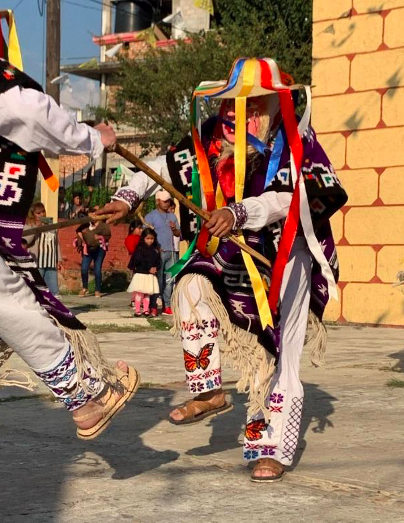
“Viejitos (Eldery) Dance” performed by Indigenous Youth at the Monarch Butterfly Forest. Photo credit: Columba Gonzalez-Duarte.
One example of the benefits of thinking together comes from Marcela’s work. Initially, her work on water was concerned with human uses only. Through this perspective on care, she has now come to notice the impacts of water scarcity on animals and ecosystems. For instance, she has documented water leaks caused by parched animals who chew through water hoses because the avocado economy has deprived them of natural water sources. Her political ecology allows us to see the region’s devastation beyond the human communities. Similarly, Columba’s multi-sited work with monarch butterflies and human migrants registers previously undocumented interconnections between instances of ecological toxicity and displacement of monarchs and people and their socioecological ties occurring across North America. We find these complexities to be simultaneously terrifying and overwhelming, and grasping their magnitude through conventional academic practices can seem impossible. Thus, we have been enabling ourselves to remain nearby to address these themes. This means crafting implications by using different technological platforms where the Patchwork Collective can meet, share, and respond to each other’s “activations,” as well as procuring cooperative in-person writing and thinking-with. We believe that collaborative writing of this nature challenges academic extractivism. However, it requires a consistent effort and ongoing dedication to stay nearby.
In a related sense, epistemic friendship is a practice which counteracts the pedagogies of cruelty, framed by Rita Segato (2018, 11) as “all acts and practices which teach, habituate and program subjects to transmute the living and its vitality in things,” which we have observed in classrooms, field sites, workplaces, and in academia at large. It distances us from notions of care that are characteristic of academic capitalism, which encourage us to think in terms of security (knowledge patents, for example) or to engage in vigilante-style practices that closely watch the citational conventions of others. We have observed, too, that practices built on care as protection can perpetuate abusive interactions, instead of activations or germinations, across authors with power differentials. As an alternative, we propose care as it emerges from appreciation and the cultivation of epistemic friendship and through inhabiting all the implications of thinking- with care (Puig 2017, 71-78). These forms of care which we nurture in our writing cross over to our practices in other spaces, such as the classroom and the wider community.
Relevance to Multi-species Anthropology
Finally, for us, an approach to caring for more-than-humans is relevant because it allows us to listen and build other possible worlds. It invites us to notice what is otherwise difficult to hear and perceive. Among other things, it allows us to respond to others and to socio-environmental problems, and to engage in worlding (mundear) (Blaser 2013:551) in other, less human-centric ways. In this light, Columba has developed a proposal to think-with the monarch butterfly to advance a more adequate environmental ethics for humans and migrant butterflies; Marcela has decentered the anthropocentric emphasis of her original work by activating a thinking-with-water, recognizing all of the relationships and beings affected by the water crisis in the Michoacán region.
Our approach in proposing forms of care as an ecology of knowledges seeks to displace extractivism from academia in general, and from anthropology in particular. We seek to counteract the cruelty of a capitalist framework which commodifies human and nonhuman vitality, including through ethnographic investigations of the “other”. Instead, we endorse creating bonds across scholars and their communities. Such forms of implication, we suggest, can help us to enact care and enable life-affirming practices, in research and beyond.
Acknowledgements
We thank our Patchwork colleagues and student partners, Professors Donna Haraway and Denise Najmanovich. Manadas con las que pensamos. We extend our gratitude to Magdalena Zegarra Chiappori and Salwa Tareen, who served as editors for this collection, for their invaluable feedback.
References
Blaser, Mario. 2013. “Ontological Conflicts and the Stories of Peoples in Spite of Europe: Toward a Conversation on Political Ontology.” Current Anthropology 54 (5): 547–68.
Haraway, Donna Jeanne, and Helena Torres Sbarbati. 2020. Seguir con el problema: generar parentesco en Chthuluceno. Bilbao: Consonni.
Najmanovich, Denise. 2021. “La naturaleza como tejido sin tejedor, sin dueño ni conductor. Hacia una ecología de saberes y cuidados.” In El tejido social en las calles sin nombre: reflexiones sobre un acompañamiento en el abordaje de las violencias cotidianas, edited by Emiliano Duering & Leticia Cufré, 236–43. Ciudad de México: Tirant humanidades.
Nguyen, Nicole, Wendy Nastasi, Angy Mejia P, Anya Stanger, and Meredith Madden. 2016. “Epistemic Friendships: Collective Knowledges and Feminist Praxis.” In Dissident Friendships: Feminism, Imperialism, and Transnational Solidarity, edited by Elora Halim Chowdhury and Liz Philipose, 11–42. Urbana: University of Illinois Press
Puig de la Bellacasa, María. 2017. Matters of Care: Speculative Ethics in More than Human Worlds. Minneapolis: University of Minnesota Press.
Rivera Cusicanqui, Silvia. 2010. Ch’ixinakax Utxiwa: Una Reflexión Sobre Prácticas y Discursos Descolonizadores. Buenos Aires: Retazos: Tinta Limón Ediciones.
Segato, Rita Laura. 2018. Contra-Pedagogías de La Crueldad. Buenos Aires, Argentina: Prometeo Libros.
Stengers, Isabelle. 2013. “Introductory Notes on an Ecology of Practices.” Cultural Studies Review 11 (1): 183–96.
Marcela Morales-Magaña is an Assistant Professor at Escuela Nacional de Estudios Superiores Morelia, UNAM. She explores water scarcity at the community level, the politics of water knowledge production and water monitoring processes from below.
Columba Gonzalez-Duarte is an Assistant Professor of Anthropology at the New School for Social Research. She explores multispecies relations between monarchs, labor migration, and Indigenous communities within North America.
